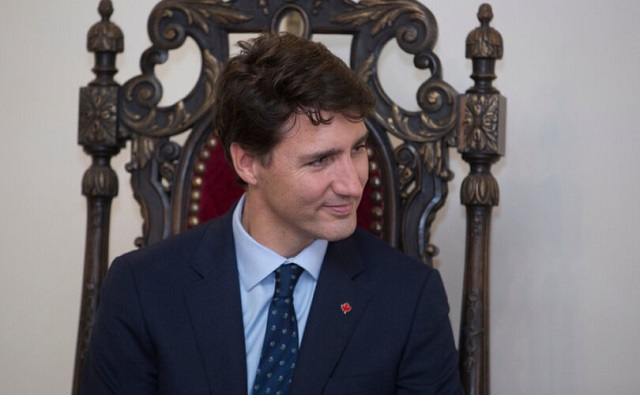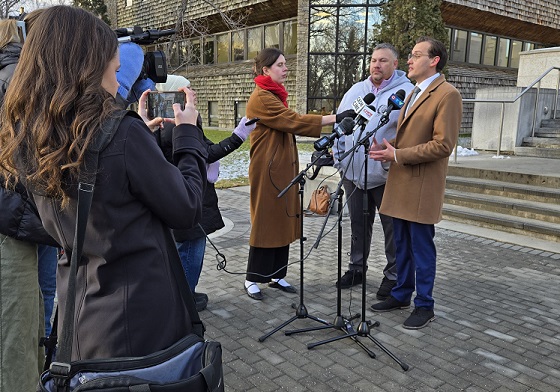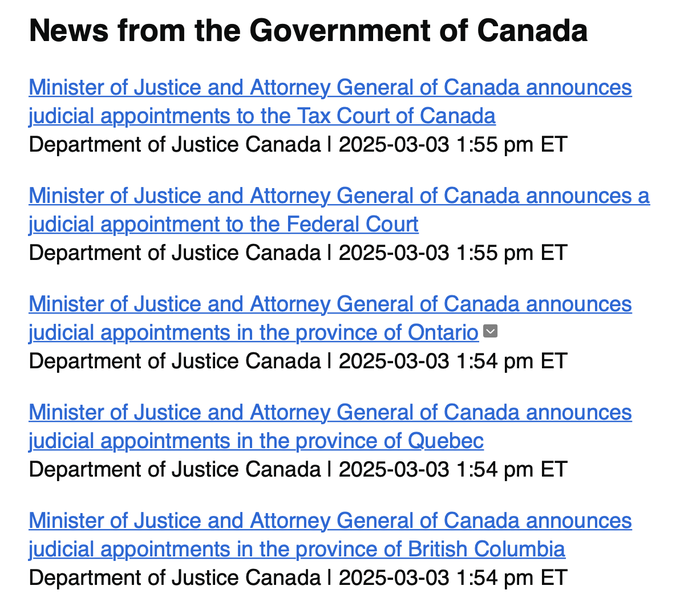National
Trudeau fills Canadian courts with Liberal-appointed judges before resigning as prime minister

From LifeSiteNews
Justin Trudeau’s Minister of Justice announced 20 judicial appointments of Liberal-leaning judges to various Canadians courts in just one day.
Prime Minister Justin Trudeau is stacking Canadian courts with Liberal judges before he steps down as Liberal leader.
On March 3, the Minister of Justice and Attorney General Arif Virani, under the direction of Trudeau, announced 20 judicial appointments of Liberal-leaning judges to various Canadians courts just weeks before Trudeau is expected to leave office.
The announcements include appointments to the Tax Court of Canada, the Federal Court, and the provincial courts of Ontario, Quebec, and British Columbia.
Indeed, according to government information from Blacklock’s Reporter, Trudeau’s last days in office have been busy. Since announcing his resignation on January 6, Trudeau has made 104 federal appointments, including judges, diplomats, “special advisors,” and federal boards.
In just the past two months, Trudeau has named Liberal appointees to the Canada Council for the Arts, Canadian Air Transport Security Authority, Canadian Broadcasting Corporation, Canadian Centre for Occupational Health, Canadian Cultural Property Expert Review Board, Canadian Energy Regulator, Canadian High Arctic Research Station, Canadian Museum of Nature, Canadian Race Relations Foundation, and Canadian Radio Television and Telecommunications Commission.
Notably, none of Trudeau’s 104 appointments can be challenged, as he suspended Parliament until March 24. This maneuver buys the Liberal Party a couple months’ time to select a new leader and rebrand their government.
As it stands, Trudeau is scheduled to stay on as prime minister until Liberals elect a new leader at an internal election scheduled for March 9.
Campaign Life Coalition’s Pete Baklinski responded to Trudeau’s judicial appointments on X, saying, “Nothing to see here. Trudeau, before he’s gone, is only stacking the courts across Canada with judges who think like he does. Business as usual. Move on.”
During his time in office, Trudeau has become well-known for appointing Liberal-friendly judges to Canadian courts. Judicial appointments have become increasingly important in recent years, as many Canadians are forced to defend their basic freedoms in the courts.
In September 2024, a Trudeau-appointed judge sentenced Freedom Convoy-inspired protesters to six years in prison for their part in the protest against COVID mandates.
Similarly, in November, a Trudeau-appointed Ontario judge dismissed an appeal from Toronto Catholic District School Board Trustee Mike Del Grande to drop charges for having objected to adding “gender identity” and “gender expression” as protected classes in the Toronto Catholic board’s code of conduct policy.
Alberta
New pipeline from Alberta would benefit all Canadians—despite claims from B.C. premier

From the Fraser Institute
The pending Memorandum of Understanding between the Carney government and the Alberta governments will reportedly support a new oil pipeline from Alberta’s oilsands to British Columbia’s tidewater. But B.C. Premier David Eby continues his increasingly strident—and factually challenged—opposition to the whole idea.
Eby’s arguments against a new pipeline are simply illogical and technically incorrect.
First, he argues that any pipeline would pose unmitigated risks to B.C.’s coastal environment, but this is wrong for several reasons. The history of oil transport off of Canada’s coasts is one of incredible safety, whether of Canadian or foreign origin, long predating federal Bill C-48’s tanker ban. New pipelines and additional transport of oil from (and along) B.C. coastal waters is likely very low environmental risk. In the meantime, a regular stream of oil tankers and large fuel-capacity ships have been cruising up and down the B.C. coast between Alaska and U.S. west coast ports for decades with great safety records.
Next, Eby argues that B.C.’s First Nations people oppose any such pipeline and will torpedo energy projects in B.C. But in reality, based on the history of the recently completed Trans Mountain Expansion (TMX) pipeline, First Nations opposition is quite contingent. The TMX project had signed 43 mutual benefit/participation agreements with Indigenous groups along its route by 2018, 33 of which were in B.C. As of March 2023, the project had signed agreements with 81 out of 129 Indigenous community groups along the route worth $657 million, and the project had resulted in more than $4.8 billion in contracts with Indigenous businesses.
Back in 2019, another proposed energy project garnered serious interest among First Nations groups. The First Nations-proposed Eagle Spirit Energy Corridor, aimed to connect Alberta’s oilpatch to a port in Kitimat, B.C. (and ultimately overseas markets) had the buy-in of 35 First Nations groups along the proposed corridor, with equity-sharing agreements floated with 400 others. Energy Spirit, unfortunately, died in regulatory strangulation in the Trudeau government’s revised environmental assessment process, and with the passage of the B.C. tanker ban.
Premier Eby is perfectly free to opine and oppose the very thought of oil pipelines crossing B.C. But the Supreme Court of Canada has already ruled in a case about the TMX pipeline that B.C. does not have the authority to block infrastructure of national importance such as pipelines.
And it’s unreasonable and corrosive to public policy in Canada for leading government figures to adopt positions on important elements of public policy that are simply false, in blatant contradiction to recorded history and fact. Fact—if the energy industry is allowed to move oil reserves to markets other than the United States, this would be in the economic interest of all Canadians including those in B.C.
It must be repeated. Premier Eby’s objections to another Alberta pipeline are rooted in fallacy, not fact, and should be discounted by the federal government as it plans an agreement that would enable a project of national importance.
Indigenous
Canadian mayor promises to ‘vigorously defend’ property owners against aboriginal land grab

From LifeSiteNews
Port Coquitlam, British Columbia, is fighting a Kwikwetlem First Nation’s claim that, if successful, would see aboriginals in essence be given large swaths of land owned by the city.
A Canadian mayor said he will “vigorously defend” the property rights of residents in light of a recent court ruling that gave a portion of a municipality to aboriginals via a title claim they won in court.
Mayor Brad West of Port Coquitlam, British Columbia, vowed to residents, “We have, and will continue to, vigorously defend public ownership of these lands, along with private property rights in our jurisdiction.”
“We will ensure the public is kept informed,” he promised in a post on X.
Port Coquitlam is fighting a Kwikwetlem First Nation’s claim made in 2016 that, if successful, would see the aboriginals in essence be given large swaths of land owned by the city.
The city said that at this time that there are “no civil claims initiated by any First Nations involving private property within the City of Port Coquitlam.”
The city promised in a statement that if the changes are made, it will notify residents immediately.
“While the City recognizes public concern resulting from recent media coverage of the Cowichan/Richmond case, it is important to note that no private lands within Port Coquitlam are currently the subject of litigation,” the statement read.
West’s comments come in light of a recent court ruling in British Columbia affecting property rights, Cowichan Tribes v. Canada (Attorney General), which saw the provincial Supreme Court rule that decades-long land grants by the government were not valid and violated a land title held by the tribes.
The ruling included large parts of Richmond, British Columbia, which is in the Vancouver area, essentially given to local tribes.
There are many other similar legal battles taking place in British Columbia, which, unlike the rest of Canada, has no official treaties in place with local Indigenous peoples but only agreements without legal clarity.
As reported by LifeSiteNews, John Carpay, founder and president of the Justice Centre for Constitutional Freedoms (JCCF), noted the court “told the people (of various ethnicities) who live in some parts of Richmond, B.C., that the money they paid for their own properties does not guarantee them the right to own and enjoy their own homes.”
Carpay noted that “the fact that aboriginal ethnic groups arrived in Canada earlier than other ethnic groups should be completely irrelevant when it comes to the application of the law.”
“Nobody disputes that different aboriginal tribes lived in this land before the arrival of Europeans, Africans, and Asians. The question is: Why should this fact matter?” he noted.
Carpay observed that when officials and courts apply the “law” differently to come after “Canadians because of their race, ancestry, ethnicity, or descent,” the predictable and inevitable outcome “is strife, resentment, and fear.”
-

 Alberta2 days ago
Alberta2 days agoPremier Smith explains how private clinics will be introduced in Alberta
-

 Alberta2 days ago
Alberta2 days agoAlberta introducing dual practice health care model to increase options and shorten wait times while promising protection for publicly funded services
-

 Business2 days ago
Business2 days agoUS Supreme Court may end ‘emergency’ tariffs, but that won’t stop the President
-

 Aristotle Foundation1 day ago
Aristotle Foundation1 day agoWe’re all “settlers”
-

 Indigenous1 day ago
Indigenous1 day agoIndigenous activist wins landmark court ruling for financial transparency
-

 Alberta1 day ago
Alberta1 day agoRed Deer’s Jason Stephan calls for citizen-led referendum on late-term abortion ban in Alberta
-

 International2 days ago
International2 days ago“The Largest Funder of Al-Shabaab Is the Minnesota Taxpayer”
-

 espionage1 day ago
espionage1 day agoSoros family has been working with State Department for 50 years, WikiLeaks shows


